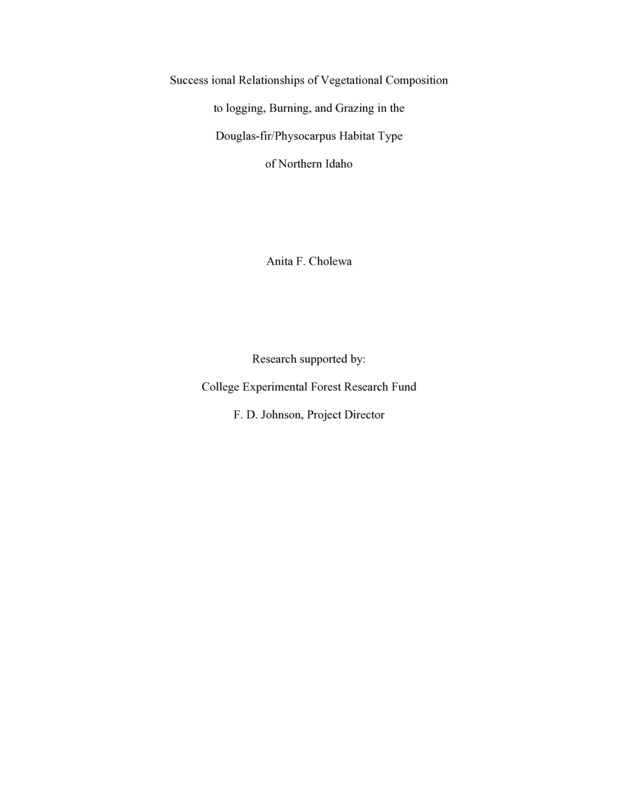PDF PREVIEW
Successional Relationships of Vegetational Composition to Logging, Burning, and Grazing in the Douglas-fir/Physocarpus Habitat Type of Northern Idaho Item Info
- Title:
- Successional Relationships of Vegetational Composition to Logging, Burning, and Grazing in the Douglas-fir/Physocarpus Habitat Type of Northern Idaho
- Creator:
- Cholewa, Anita F.
- Date Created:
- 1977
- Description:
- The Pseudotsugea menziesii/ Physocarpus malvaceus habitat type is an important timber-producing habitat type in the northern Rockies. It also has good potential for livestock grazing, and many of the member shrubs are important big game browse species. Little, however, is known regarding success ional relationships of vegetative composition. Descriptions were made of some of the seral communities in this habitat type and an ordination of these same communities was also made to develop a secondary success ional sequence. Stands undisturbed since 1900 have vegetative compositions which generally parallel published records of climax Douglas fir/ Physocarpus communities. Burning produced high cover of Ceanothus sanguineus and Spiraea betulifolia, while logging produced high cover of Holodiscus discolor and Rosa gymnocarpa. Rosa nutkane is the only shrub with highest cover on grazed sites. In the herbaceous layer, Calamagrostis rubescens has high cover on burned sites while Arnica cordifolia has high cover on logged sites. Species composition in the herbaceous layer of grazed sites shows the most deissimilarity to other sites. The ordination produced results which, when graphed, form a cone or pyramid-like model of succession. Highly disturbed sites form the base and climax sites form the apex. The time required to reach climax is related to degree or intensity of disturbance. Disturbance intensity is the most important factor affecting succession. The success ional sequence, furthermore, can not be divided into recognizable stages, but forms a continuum with vertical as well as horizontal direction.
- Document Type:
- Research
- Library Call Number:
- QH541.5.F6C56
- Subjects:
- Latah North Idaho succession successional relationships vegetational composition burning grazing logging forest ecology
- Location:
- Latah County
- Department:
- Department of Forest Resources
- Type:
- Text
- Format:
- application/pdf
Source
- Preferred Citation:
- "Successional Relationships of Vegetational Composition to Logging, Burning, and Grazing in the Douglas-fir/Physocarpus Habitat Type of Northern Idaho", UIEF Research Exchange, University of Idaho Library Digital Collections, https://www.lib.uidaho.edu/digital/uief/items/uief_0031.html
Rights
- Rights:
- In copyright, educational use permitted.
- Standardized Rights:
- http://rightsstatements.org/vocab/InC-EDU/1.0/

